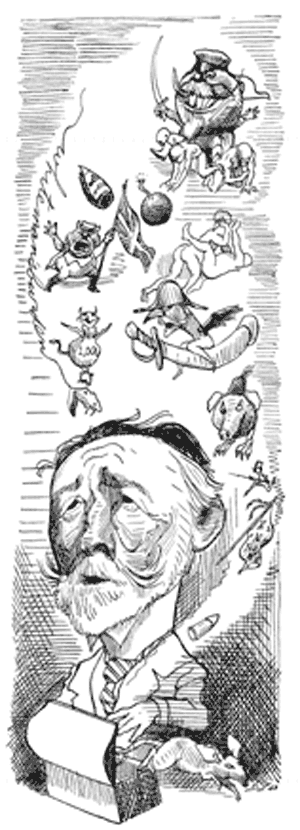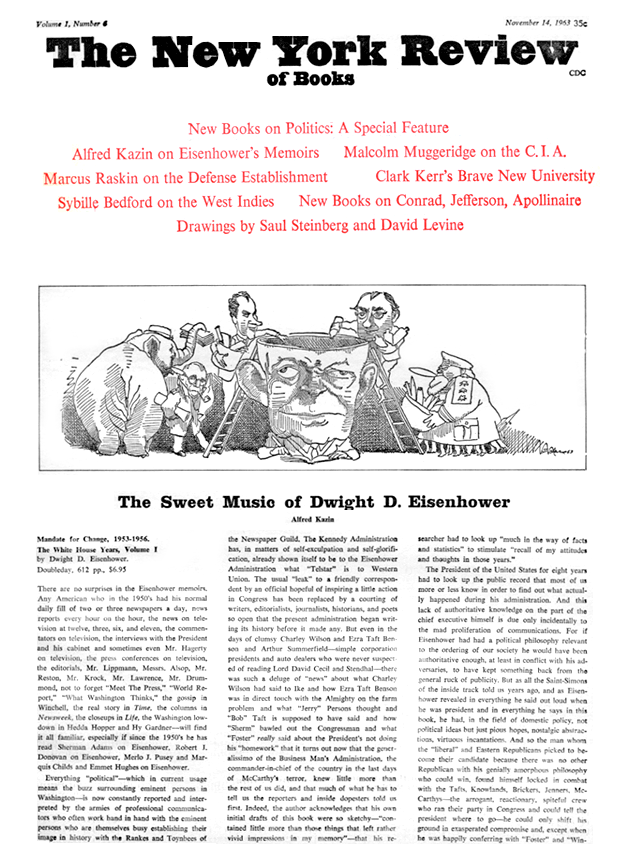Charles Gould’s fits of abstraction depicted the energetic concentration of a will haunted by a fixed idea. A man haunted by a fixed idea is insane. He is dangerous even if that idea is an idea of justice…
—Nostromo
The ideas (that live) should be combatted, not the men who die.
—Conrad, in a letter to William Blackwood.
October 29, 1897
Conrad systematically avoided all political commitment. He never voted in a British election in spite of his respect for English institutions; nor would he involve himself in Polish affairs. He distrusted socialism—as leading inevitably to “Caesarism”—yet loathed capitalism; autocracy and revolution he saw as alternate faces of a base coin. Although he sailed in an English ship when the navy was the vanguard of British imperialism, in private he despised the “appalling fatuity in this business.” Yet when asked by his friend Cunninghame-Graham to support a plan of “international brotherhood” he answered with bitterness: “Fraternity means nothing unless the Cain-Abel business. That’s your true fraternity.”
A plague on both your houses? Not really. “We must fight in the ranks or our lives don’t count”; “We must hang together”—his work continually demonstrates that eminently political lesson. He distrusted all abstract ideas because of the inhumanities commited in their name, yet he believed in certain fixed standards that could govern conduct. He saw state action as a form of vanity and disguised aggression: but on the personal level “man is a worker. If he is not that he is nothing.” What lies behind these paradoxes? Conrad certainly believed that man cannot live alone, but when he so accurately singled out the rotten patches in contemporary forms of government, what alternative means of group functioning did he have in mind? How, exactly, did he think man can live with his necessary neighbors?
In this interesting study, Mrs. Hay has addressed herself to the task of explaining some of these paradoxes. She sees, rightly, that “Conrad’s much-stressed preoccupation with human isolation is both the cause and result of his strong sense of man’s involvement in social effort.” She has scrutinized manuscripts, had Polish material translated, and introduced relevant historical data, thus suggesting many new ways of looking at some of Conrad’s major novels. She starts her account with early and little-known Polish influences on Conrad, revealing his devotion to the abolished constitution of the old Polish Republic and to the never-realized Polish “tradition of self-government, its chivalrous view of moral restraints and an exaggerated respect for individual rights”—as he put it.
This is an important clue. Conrad’s ideal Polish “nationalism” was never imperialistic, aggressive, or autocratic in home affairs; it was a stable “hanging together” based on self-discipline and a correct concern for duty to others. With this model in mind, he could turn his scorn on “Russian lawlessness” or “German submissiveness,” indeed on any form of government that tended to the extremes of anarchic commercial individualism and brutal totalitarianism. (He twice intended a telling comparison between the emerging America and Russia, but—Mrs. Hay has the evidence—most of the denigration of America was deleted from his published work.)
Conrad’s father and his uncle—two vastly different personalities—were another influence. The former was a self-sacrificing, idealistic revolutionary; the latter a figure out of Conrad, with suspicion of “grandiose ideals” and “love of the duty which circumstances define.” In addition to the romantic father and the pragmatic uncle, there was an impulsive black sheep of the family whose “fatal influence” Conrad’s uncle feared he could see at work in his nephew. If Conrad was the homo duplex he described himself to be, and if there are many alter egos and “unforeseen relationships” in his fiction, it is partly due to a working out of his contradictory heritage. He came deeply to suspect romantic ideals and sudden impulses—but he knew the allure of the one and the tug of the other; they were the preoccupation of his later fiction. His uncle’s cool, consistent pragmatism was the source from which he drew the political imperative with which to meet them.
In her examination of the major novels, Mrs. Hay shows that throughout his life Conrad labored to uncover the dangerous egotism that inspired the high mission of Western civilization to bring light to the “dark” world. In his early novel, The Rescue, however, he was still holding back the full force of the indictment: Lingard, with the best intentions, interferes disastrously in native affairs; but in making him abandon his native friends at the prompting of a sudden passion for a European society lady, Conrad falsified the book into the love story he had promised his publishers. The real threat to Lingard was represented not by this hollow “Venus in Victorian drapery,” but by a character Conrad subsequently suppressed—a man who had gone completely native. At this stage, Mrs. Hay comments: “Conrad was not sure what he meant to say to his English readers about progress, civilization, and the suppression of primal instincts.” In Heart of Darkness he had more assurance, but was correspondingly more evasive.
Advertisement
In her best chapter Mrs. Hay shows that a careful reading of this novel reveals a total indictment of all Western ideals (even “efficiency” is made to seem futile). Marlow looks at Kurtz’s painting of a blindfolded woman carrying a lighted torch. He sees in it a stately woman, but the light has made her face “sinister”: the torch of Western enlightenment is doing ominous things to the blind torch-bearer. Kurtz has revealed his own fate in the portrait. When Marlow defends imperialism because it has “an idea back of it…something you can set up, and bow down before.” this is not Conrad’s voice: to read it in this way is to miss the whole point.
For Conrad, ideas become idols and corrupt as Kurtz is corrupted by the idolatry he invites (and as Marlow is nearly corrupted). It is the white man’s “light” that is the true darkness: Africa’s darkness is only that of innocent ignorance. The horror Kurtz finally sees is in himself and in the Europe that made him. And when Marlow lies to Kurtz’s fiancée back in Europe (as Chamberlain lied about Rhodes), he does it to save a civilization already dead at heart. (I entirely agree with Mrs. Hay that the fiancée’s house is an emblem for the whole dying house of Europe.) We live, as Conrad often felt himself to live, in “romantic ruins pervaded by rats.”
Lord Jim had personal ideals and ambitions; whereas Kurtz’s were the ideals of Progress. In Nostromo Conrad shows everybody acting under the illusion of some sort of idea—and the futility and chaos are vast. Once the silver is awakened from its slumber in the “paradise of snakes,” a variety of idealizations precipitate a variety of destructions. “The incredible infatuation which could put its trust in the peaceful nature of industrial and commercial ambition” is shown in all its effects. Despite idealism a vicious squabble for booty develops: pity and justice die underfoot. Two types emerge: men with “an insatiable imagination of conquest,” and their victims; all too often of “the pitiless enthusiasms of leaders inspired by visions of a high destiny.” As Mrs. Hay says, Conrad here attacks “all the false gods of modern politics.”
In The Secret Agent, the despots and revolutionaries have become grotesquely comic but there are still real, human victims: Winnie, her mother, and the idiot Stevie “blown to bits for nothing even remotely resembling an idea.” It is the sheer absurdity of the “blood-stained inanity” that Conrad underlines. In Under Western Eyes the absurdity of things receives profounder treatment. Mrs. Hay sees Razumov’s experience as peculiarly Russian. But to me the drama is supra-political. Razumov is a man with a mind (razumet means “thinking man”) but nothing else. He tries to lead a logical life, but Haldin, the revolutionary, crashes into his life, uninvited yet inescapable, and the unattached intelligence cannot cope with the irrationalities of the world. Razumov’s intense isolation makes him peculiarly vulnerable. Still, the novel is not mainly about his oscillating convictions, but about the intense inner drama which involves a logical betrayal, an unreasonable yet stifling remorse, an illogical but remedial confession. This is Conrad’s deepest inquiry into the helplessness of intelligence in an absurd world. The subtlest attack in the book is on those “Western eyes”: myopic, smug, unaware of the horrors which today may seem peculiarly Russian but which tomorrow may be the lot of Everyman.
Conrad was indeed a pessimist, one of the greatest, and it was with his anguished honesty that he covered “the whole morality of modern politics” (Mrs. Hay). He saw no inevitable progress in the drift of history: “Our captivity within the incomprehensible logic of accident is the only fact of the universe.” and the only history to emerge from such a universe will perforce be “a history of a really very relentless warfare.” Conrad’s experience had taught him to be wary of ideas since an idea “tends to lose its ‘virtue’ the moment it descends from its solitary throne to work its will among the people.” Yet some idea of community obligation is necessary. What does Conrad offer us? Dr. Monygham, in Nostromo, sees that nothing can come of any form of material progress because it is “without the continuity and force that can be found only in a moral principle.” Decoud, who sees through everybody’s illusions, nevertheless evaporates into the vast indifference of the universe because he has no faith in himself and others. He is not evil but he cannot endure. Conrad believed, irrationally if you like, in “the worth and force of the inner life.”
Advertisement
Conrad has been accused of not caring for humanity. There is bitter irony in this. “The truth of his nature consisted in his capacity for passion and in the sensitiveness of his temperament. What he lacked was the polished callousness of men of the world, the callousness from which springs an easy tolerance for oneself and others.” These lines on Dr. Monygham apply directly to Conrad. His austerity and controlled pride concealed a great pain on man’s account. There is something very moving in this uncharacteristic confession to Arthur Symons in a letter Conrad wrote in 1908:
I’ve tried to write with dignity, not out of regard for myself, but for the sake of the spectacle, the play with an obscure beginning and an unfathomable dénouement. I don’t think that this has been noticed. It is your penitent beating the floor with his forehead and the ecstatic worshipper at the rails that are obvious to the public eye. The man standing quietly in the shadow of the pillar, if noticed at all, runs the risk of being suspected of sinister designs. Thus I’ve been called a heartless wretch, a man without ideals and a poseur of brutality. But I will confess to you under the seal of secrecy that I don’t believe I am such as I appear to mediocre minds.
This Issue
November 14, 1963



